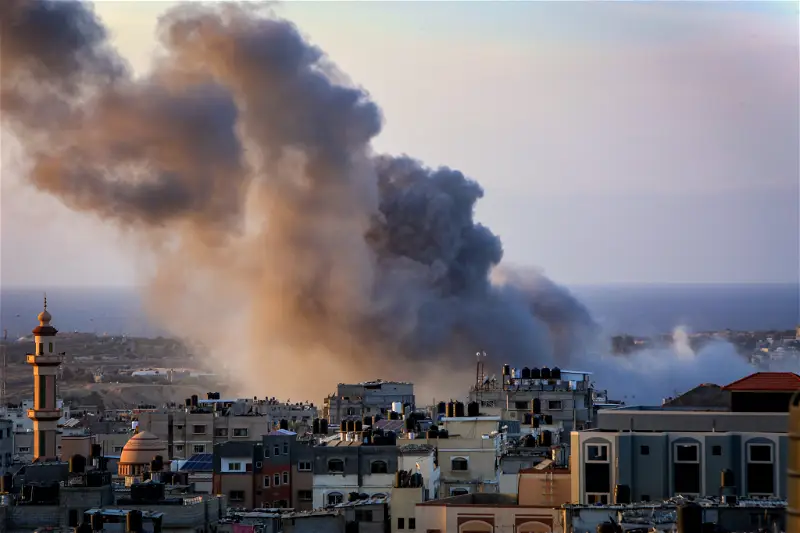Headline
Israel Bombs Gaza, Fights Hamas Around Hospitals

Israeli forces pounded besieged Gaza on Wednesday in the war sparked by the October 7 attack and fought Hamas around several hospitals despite a UN Security Council demand for a ceasefire.
Talks in Qatar towards a truce and hostage release deal, involving US and Egyptian mediators, have brought no result so far, with Israel and the Palestinian militant group blaming each other.
Tensions have risen between Israel and its top ally the United States over the soaring civilian death toll and dire food shortages in Gaza, and Israeli plans to push its ground offensive into the far-southern city of Rafah, which is packed with displaced civilians.
In heavy overnight bombardment, Israeli strikes again hit Gaza City and Rafah, where a fireball lit up the sky over the city crowded with up to 1.5 million people, most of them displaced by the war.
The health ministry in Hamas-run Gaza said 66 people were killed in overnight bombardment and combat.
Israeli forces have battled militants in and around three Gaza hospitals, raising fears for patients, medical staff and displaced people inside them.
Fighting has raged for nine days around Gaza City’s Al-Shifa Hospital, the territory’s largest, and more recently near two hospitals in the main southern city of Khan Yunis, Al-Amal and Nasser.
The army and Shin Bet security service said they were “continuing to conduct precise operational activities” in both cities “while preventing harm to civilians, patients, medical teams and medical equipment”.
The army said “Troops continued to eliminate terrorists and locate terror infrastructure and weapons” around Al-Shifa.
READ ALSO: Nigerian Female Engineer Invents Smart Bra To Detect Breast Cancer
“Thus far, hundreds of terrorists have been apprehended and dozens of terrorists have been killed in the area of the hospital,” it said.
Israeli tanks and armoured vehicles have also massed around the Nasser Hospital, the Gaza health ministry said, adding that shots were fired but no raid had yet been launched.
The Palestinian Red Crescent warned that thousands were trapped inside and “their lives are in danger”. The Israeli army has yet to comment on the situation in and around the hospital.
UN warns of ‘man-made famine’
Gaza has endured almost six months of war and a siege that has cut off most food, water, fuel and other supplies, and the UN has warned that its 2.4 million people are on the brink of a “man-made famine”.
The flow of aid trucks from Egypt has slowed amid the war and due to lengthy Israeli cargo inspections.
Donor governments have airdropped food into Gaza where desperate crowds have rushed towards aid packages drifting down on parachutes. At least 18 people have been reported killed in stampedes or drowned in the Mediterranean Sea.
Hamas has urged an end to the airdrops and called for stepped-up road deliveries instead. The United States said it would keep airdropping humanitarian supplies while also pushing for more overland deliveries.
The war broke out when Hamas launched its unprecedented October 7 attack that resulted in about 1,160 deaths in Israel, mostly civilians, according to an AFP tally of Israeli official figures.
READ ALSO: Three UK-based Nigerians Defraud Vodafone, Other Firms Of £429,304
The militants also took about 250 hostages. Israel says that, after an earlier truce and hostage deal, about 130 captives remain in Gaza, including 34 who are presumed dead.
Israel’s retaliatory campaign has killed at least 32,414 people in Gaza, most of them women and children, according to the health ministry.
Israel also charges that Palestinian militants sexually assaulted October 7 victims and hostages.
The New York Times published a report on the first Israeli woman to speak publicly about having been sexually abused, 40-year-old lawyer Amit Soussana.
Soussana, who was abducted from a kibbutz on October 7 and released in November, said she was repeatedly beaten and sexually assaulted at gunpoint by her guard inside Gaza.
Israeli military spokesman Daniel Hagari said that her abuse “is a wake up call to the world to act. To do everything and pressure Hamas. To free our hostages. To bring our hostages home.”
Death toll ‘far too high’
The UN Security Council on Monday passed its first resolution demanding an “immediate ceasefire” in Gaza and the release of the captives.
The United States, which had blocked previous resolutions, abstained, drawing an angry rebuke from Israeli Prime Minister Benjamin Netanyahu.
The right-wing premier cancelled an Israeli delegation’s planned visit to Washington, although Defence Minister Yoav Gallant was already there.
READ ALSO: Ghana’s High Commissioner To Nigeria Is Dead
Pentagon chief Lloyd Austin stressed, before meeting Gallant, that “the number of civilian casualties is far too high, and the amount of humanitarian aid is far too low” in Gaza.
Despite the tensions, Rear Admiral Hagari said security cooperation was closer than ever, “encompassing the entire US military and the US intelligence services”.
Israeli and Hamas envoys have engaged in weeks of indirect talks aimed at halting the fighting, but both sides said this week the talks were failing.
Qatari foreign ministry spokesman Majed al-Ansari has said that, although the CIA and Mossad chiefs had left Doha, the talks were “ongoing” at a technical level.
Hamas leader Ghazi Hamad charged that Israel “is being intransigent and wants to keep the war going, despite international positions and in defiance to UN Security Council’s decision to cease fire during Ramadan,” the ongoing Muslim holy month of fasting.
“There hasn’t been any progress in ceasefire talks or negotiations for prisoners’ exchange,” he said. “The Israeli government’s procrastination is just a way to gain time and keep their aggression going.”
Amid the bloodiest-ever Gaza conflict, Israel has also exchanged daily cross-border fire with Hamas ally Hezbollah based in southern Lebanon.
The hostilities, in which Israel has also targeted Hamas militants, have raised fears of all-out conflict between Israel and Hezbollah, which fought a devastating war in 2006.
Hezbollah fired a barrage of rockets into northern Israel Wednesday killing a civilian, after Israel carried out a deadly pre-dawn strike in south Lebanon.
AFP
Headline
U.S. Lawmaker Reacts To Nigeria, U.S. Airstrikes

United States Congressman, Riley Moore, has stated that President Donald Trump is determined to put an end to the killing of Christians in Nigeria, warning that further action may follow if the violence persists.
Moore made the statement on Friday via his official X handle.
According to the lawmaker, the strike represents the first step in addressing what he described as the ongoing slaughter of Christians and the broader security crisis affecting Nigerians across religious and ethnic lines.
READ ALSO:US Dept Of War Shares Video Of Air Strikes In Nigeria
“President Trump has been clear that the killing of Christians in Nigeria must end,” he said.
He that the administration’s resolve on the matter should not be underestimated.
“As I stated at the outset: Do not test President Trump‘s resolved in this matter.
READ ALSO:JUST IN: US Forces Bomb Terrorists Camps In Nigeria
“Tonight’s strike in coordination with the Nigerian government is just the first step to ending the slaughter of Christians and the security crisis affecting all Nigerians,” he said.
He stressed that the operation signals a stronger stance by the United States in support of Nigeria’s efforts to tackle terrorism and violent extremism, noting that further measures could be taken if the situation does not improve.
Headline
US Dept Of War Shares Video Of Air Strikes In Nigeria

A video footage of the US military air strikes in Nigeria has emerged.
The video was released by the US Department of War following its air strikes against terrorists in Sokoto.
Earlier, the US secretary of War, Pete Hegseth had confirmed that military air strikes hit terrorists in Nigerians, saying it was deadly.
Later on, the US. African Command, confirmed that it conducted the attacks described as very deadly by President Donald Trump.
Trump said he was only keeping the promise he made earlier last month to strike the terrorists he believes are killing innocent Christians.
READ ALSO:JUST IN: US Forces Bomb Terrorists Camps In Nigeria
Although described as powerful and deadly, the casualty caused by the attack is yet to be released.
Explaining further, security expert, Brant Philip, said the strikes may have been launched “from the USS Paul Ignatius, using a Tomahawk missile.”
The Nigerian government through its ministry of foreign affairs has also confirmed that the strikes were successful.
Watch video here
Headline
JUST IN: US Forces Bomb Terrorists Camps In Nigeria

United States President Donald Trump said US forces conducted deadly strikes against Islamic State terrorists in northwestern Nigeria, and vowed more attacks if the militants keep killing Christians.
“I have previously warned these Terrorists that if they did not stop the slaughtering of Christians, there would be hell to pay, and tonight, there was,” Trump posted on his Truth Social platform, adding that “the Department of War executed numerous perfect strikes.”
READ ALSO:JUST IN: Kano Lawmaker, Sarki Aliyu Daneji, Dies Hours After Colleague’s Passing
Trump stated that the Department of War “executed numerous perfect strikes, as only the United States is capable of doing. Under my leadership, our Country will not allow Radical Islamic Terrorism to prosper.”
The US president wished everyone Merry Christmas, “including the dead Terrorists, of which there will be many more if their slaughter of Christians continues.”
Details later.

 News4 days ago
News4 days agoPHOTOS: New Era In Furupagha-Ebijaw As Okpururu 1 Receives Staff Of Office

 News3 days ago
News3 days agoUBTH CMD Marks 120 Days In Office, Expresses Commitment To Providing Conducive Working Environment

 News4 days ago
News4 days agoOPINION: Gumi And His Terrorists

 News4 days ago
News4 days agoFIRS Confirms NIN As Tax ID

 News4 days ago
News4 days agoFG Declares Public Holidays For Christmas, New Year Celebrations

 Metro3 days ago
Metro3 days agoFintiri Pardons Man Sentenced To Death For ‘Killing Herdsman In Self-defence’, Others

 News4 days ago
News4 days agoOPINION: Christmas And A Motherless Child

 News2 days ago
News2 days agoJUST IN: Kano Lawmaker, Sarki Aliyu Daneji, Dies Hours After Colleague’s Passing

 News4 days ago
News4 days agoOPINION: My Man Of The Season

 News4 days ago
News4 days agoKWAM 1 Withdraws From Awujale Race, Ends Court Challenge


























